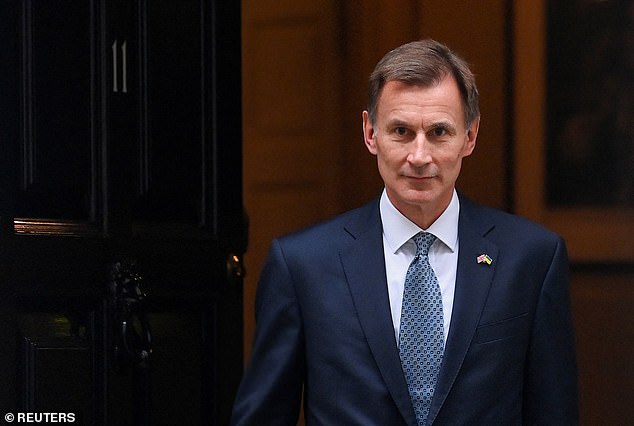
Britain will have the highest debt burden of any major economy after the real cost of a decades-long borrowing binge was laid bare in Chancellor Jeremy Hunt’s Budget.
Hunt last week sanctioned a punishing package of tax rises and spending cuts to bring underlying debt as a proportion of national income down after three years in a move designed to reassure jittery financial markets.
But the total cost of servicing the Government’s £2.4trillion debt pile is set to hit an eye-watering £584billion over the next six years – or almost four times the annual budget of the National Health Service.

The cost of servicing Britain’s debt was laid bare by Chancellor Jeremy Hunt’s Autumn Statement
The interest bill on that huge amount of borrowing is expected to peak this year at a whopping £120 billion. or £1,800 per person, according to the Office for Budget Responsibility, the independent watchdog.
The staggering sum is equal to 4.8 percent of annual output or 12 percent of revenue – in both cases, the highest since immediately after the Second World War.
It means the amount spent on debt servicing will soar above that of Italy – Europe’s most indebted country – and will be far higher than that of US or Japan, according to latest European Commission data.
‘It is an astonishingly high number,’ said Stefan Koopman, senior macro strategist at Rabobank, an investment bank. ‘Having to pony up that much to service the costs of existing debt is going to crowd out a lot of spending on public services and investment.’
Analysts say the reason the UK’s debt bill is so high is because so much of it is linked to inflation.
The OBR estimates 22 per cent of public borrowing is now linked to the retail prices index (RPI), compared to 6 per cent in 2000-01.
RPI is currently running at 14.2 percent, far higher than the consumer prices index at 11.1 percent, making the debt burden even bigger.
But the Government is still forecast to be spend more than £100 billion in debt interest payments in 2027/28, according to the OBR.
‘All that borrowing we’ve done over the last many years is coming home to roost,’ said Paul Johnson, director at the Institute for Fiscal Studies think-tank.
Britain pioneered the use on inflation-linked gilts – or IOUs – in the 1980s to fund public spending and investment.
Years of ultra-low interest rates kept a lid on the cost of servicing the national debt – and kept the pension funds who bought these gilts happy as their members were shielded from the risk of rising prices.

But the financial crisis, Covid and Russian invasion of Ukraine have led to record amounts of debt being issued – and, latterly, prices and the cost of borrowing to soar, leaving the UK uniquely exposed.
‘It is not only the scale, but also the speed with which higher interest rates and inflation have pushed up debt servicing costs that is a warning to this and future Chancellors,’ OBR chairman Richard Hughes warned.
‘The debt interest burden over the next five years is projected to be almost twice as large as UK governments have become accustomed to over the past two decades,’ he added.
‘The share of government resources consumed by the cost of servicing that debt to its highest level in a generation.
‘This leaves the UK’s public finances more sensitive to movements in interest rates than they have been for decades.’
The Treasury’s Debt Management Office was approached for comment.
#fiveDealsWidget .dealItemTitle#mobile {display:none} #fiveDealsWidget {display:block; float:left; clear:both; max-width:636px; margin:0; padding:0; line-height:120%; font-size:12px} #fiveDealsWidget div, #fiveDealsWidget a {margin:0; padding:0; line-height:120%; text-decoration: none; font-family:Arial, Helvetica ,sans-serif} #fiveDealsWidget .widgetTitleBox {display:block; float:left; width:100%; background-color:#af1e1e; } #fiveDealsWidget .widgetTitle {color:#fff; text-transform: uppercase; font-size:18px; font-weight:bold; margin:6px 10px 4px 10px; } #fiveDealsWidget a.dealItem {float:left; display:block; width:124px; margin-right:4px; margin-top:5px; background-color: #e3e3e3; min-height:200px;} #fiveDealsWidget a.dealItem#last {margin-right:0} #fiveDealsWidget .dealItemTitle {display:block; margin:10px 5px; color:#000; font-weight:bold} #fiveDealsWidget .dealItemImage, #fiveDealsWidget .dealItemImage img {float:left; display:block; margin:0; padding:0} #fiveDealsWidget .dealItemImage {border:1px solid #ccc} #fiveDealsWidget .dealItemImage img {width:100%; height:auto} #fiveDealsWidget .dealItemdesc {float:left; display:block; color:#004db3; font-weight:bold; margin:5px;} #fiveDealsWidget .dealItemRate {float:left; display:block; color:#000; margin:5px} #fiveDealsWidget .dealFooter {display:block; float:left; width:100%; margin-top:5px; background-color:#e3e3e3 } #fiveDealsWidget .footerText {font-size:10px; margin:10px 10px 10px 10px;} @media (max-width: 635px) { #fiveDealsWidget a.dealItem {width:19%; margin-right:1%} #fiveDealsWidget a.dealItem#last {width:20%} } @media (max-width: 560px) { #fiveDealsWidget #desktop {display:none;} #fiveDealsWidget #mobile {display:block!important} #fiveDealsWidget a.dealItem {background-color: #fff; height:auto; min-height:auto} #fiveDealsWidget a.dealItem {border-bottom:1px solid #ececec; margin-bottom:5px; padding-bottom:10px} #fiveDealsWidget a.dealItem#last {border-bottom:0px solid #ececec; margin-bottom:5px; padding-bottom:0px} #fiveDealsWidget a.dealItem, #fiveDealsWidget a.dealItem#last {width:100%} #fiveDealsWidget .dealItemContent, #fiveDealsWidget .dealItemImage {float:left; display:inline-block} #fiveDealsWidget .dealItemImage {width:35%; margin-right:1%} #fiveDealsWidget .dealItemContent {width:63%} #fiveDealsWidget .dealItemTitle {margin: 0px 5px 5px; font-size:16px} #fiveDealsWidget .dealItemContent .dealItemdesc, #fiveDealsWidget .dealItemContent .dealItemRate {clear:both} }